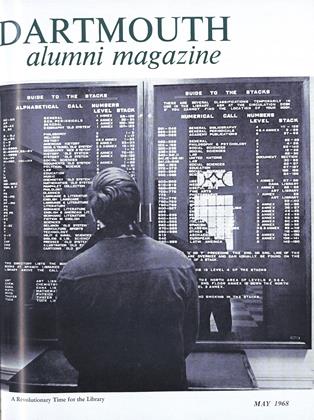BEHIND the participation of two Dartmouth delegations in the 1968 National Model United Nations, in New York in February, were many weeks of organization, research, and serious study, but all this effort came to a successful climax when one group was chosen among the ten best delegations at the N.M.U.N, and the other had the satisfaction of performing extremely well.
The organizing began in the late fall. We asked to represent Japan on the Economic and Social Council and were granted this choice. There were several reasons for our request, the greatest being the availability of highly qualified foreign students from Japan and of professors who had spent some time in that country. Professors Almon Ives (Speech) and Ernest Young (History) spoke to us, and Yoshihiro Nakamura '68 and Norifumi Shimura, a special student, were to become members of the Japanese delegation. A third Japanese student, Hiroshi Miyata, became a member of a second delegation, representing the Philippines in the General Assembly. Since we wanted more students to be able to participate in the N.M.U.N., we decided to ask for this second delegation. Jose Moral '70 became its chairman, while Peter Van Demark '70 chaired the Japanese group and coordinated their Experimental College course.
Training of the delegates began in the Winter Term and continued through the six short weeks before the February 15 start of the N.M.U.N., held at the Statler Hilton in New York City. The DEC course was called "The U.N. in Action." Dean Waldo Chamberlain, former documents officer at the U.N., offered excellent background information on the United Nations; during the second week the prospective delegates were tested on this, in anticipation of a similar test to be given at the Model U.N. This preparation paid off when E. Barry Skolnick '6B scored highest among the eleven award winners on the N.M.U.N. test. Lincoln Rathnam '71 and Yoshihiro Nakamura '6B also were high scorers.
A second test was held during the DEC course after several professors spoke on Japan and the Philippines. Speaking on the latter country were Professors Charles McLane (Government) and Robert Huke (Geography). The two tests served as major criteria for making the final selection of delegates. For two weeks just before February 15 each delegation met, wrote and discussed resolutions (some of which were later debated and passed at the N.M.U.N.), and shared the facts gleaned from U.N. documents in Baker Library.
The value of these preparations was put to the test when the twelve delegates and our faculty adviser, Professor David Baldwin (Government) arrived at the Statler Hilton to take part in the fourday session, February 15-18. Besides the hours of committee, plenary or Council meetings every day, each delegate found himself visiting his country's Mission to the U.N., listening to talks by U.N. experts, politicking (and socializing) into the small hours at parties given by other delegations, attending the banquet, dance and Sunday Awards Brunch, and trying to get some sleep before a cheerful switchboard operator announced the new day. The delegates were spared most of the logistical problems by Peter Van Demark, who acted as the coordinator for both delegations and handled the mundane matters connected with all conventions.
The weekend was capped by the recognition of Dartmouth's Japanese delegation as one of the ten best delegations, out of the 171 participating. Benjamin Cohen's book, The United Nations: ConstitutionalDevelopment, Growth andPossibilities, was presented to the group to signify this achievement. The delegation members were Yoshihiro Nakamura '68, Thain Ramey '69, Norifumi Shimura, E. Barry Skolnick '68, and Peter Van Demark '70, chairman.
The Philippine delegation from Dartmouth also performed well, and produced several members who will hopefully continue to be active in Dartmouth's U.N. delegations. Members of this contingent were Jose Moral '70, chairman, Garrick Giebel '69, Mark Mitchell '71, Hiroshi Miyata, Michael Monson '71, and Leonid Turkevich '71.
Making the whole thing possible were the Cosmopolitan Club and the Public Affairs Center. They underwrote the substantial expenses of the two delegations, thus eliminating the problem of finances that plagued many of the other groups at the N.M.U.N.
Special thanks for the success of our delegations are extended to Dean Waldo Chamberlain and Professor Baldwin, who served ably as advisers and U.N. experts.
Will we reach the same level next year? We are already working on it.
 View Full Issue
View Full Issue
More From This Issue
-
 Feature
FeatureThe Making of a Primary Winner
May 1968 By WINTHROP A. ROCKWELL '70 -
 Feature
FeatureDartmouth's Alumni Relations
May 1968 -
 Feature
FeatureThe Library Revolution
May 1968 By Clifford L. Jordan '45 -
 Article
ArticleOxford Revisited
May 1968 By JOHN G. GARRARD, -
 Article
ArticleThe Undergraduate Chair
May 1968 By JOHN BURNS '68 -
 Class Notes
Class Notes1941
May 1968 By EARL H. COTTON, ROBERT G. THOMAS
Article
-
 Article
ArticleDR. HOPKINS MAKES TWO SPEAKING TRIPS
March 1925 -
 Article
ArticleHobart Inaugural
October 1936 -
 Article
Article3 Trustee Vacancies Occurring in July
OCTOBER 1970 -
 Article
ArticleThe Fund: All Together Now
September 1979 -
 Article
ArticleHanover Browsing
May 1952 By HERBERT F. WEST '22 -
 Article
ArticleWhen We Were Freshmen
May 1935 By Warde Wilkins '13

